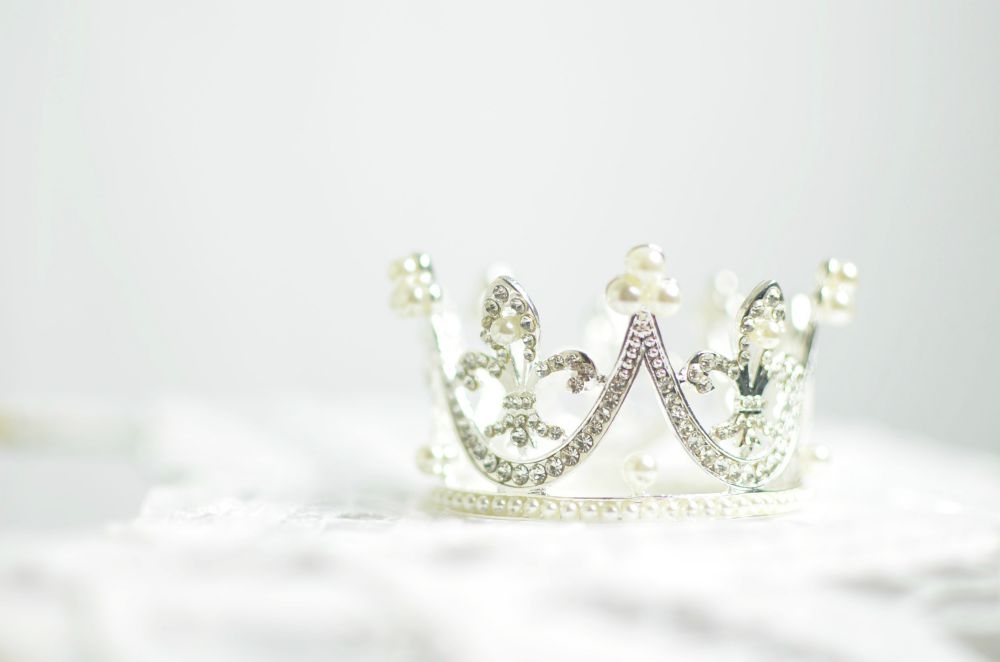
(Unsplash/Ashton Mullins)
I never once wanted to be a princess. I didn't want the flowing dresses. I didn't want the crown or tiara that would presume I put my hair in an up-do. I didn't (nor do I now) want to put on make-up.
I never really got into make-believe growing up. To tell you the truth, I grew up playing church, store and restaurant. Yup! You guessed it! I always wanted to be the priest, cashier and chef. All these roles seemed accessible to me. None of them seemed behind a glass wall or ceiling.
The closest thing our church and school had to a pageant was the 8th-grade slow-motion performance of the Stations of the Cross. Every year, we looked forward to who was going to play the title roles. We watched as the Roman soldiers moved in unison and discipline. We watched the women flutter to Jesus, shirtless by the cross. We watched the three altar servers take the candles and crucifix to each station along the perimeter of the church.
I love to watch, but I never like to play dress up. So when my church asked me to dress up as Mary and carry a real child, Jesus, for an entire liturgy, I was overwhelmed. I did not want that kind of attention on me. I felt shame for not living up to the grace and obedience that Mary emulated. I was consumed by what others would think. This was going to be embarrassing.
Maybe it was years of internalized "sinnner-and-saint binary" that crept in to tell me I wasn't good enough to play this holy and chosen bearer of God. Maybe it was all the voices of my junior high and high school peers whose eyes I could feel rolling to the back of their heads when I would get picked, "Of course, Jocelyn would get chosen."
Advertisement
Whatever it is, this feeling of unworthiness is still strong in me, which leads me to the point of this essay: The impact that white supremacist capitalist patriarchy (see: bell hooks) runs so deep that any time a person from the margins of this society is elevated to standards of dignity and beauty, these are the moments we ought to pay attention to. These are the moments that God is trying to break-through to shed light on the coming kin-dom.
It may sound petty and superficial to talk about beauty pageants when our global society seems to be on the brink of collapse: the violence in Hong Kong and the growing tension between the police and protesters, the impeachment of the leader of the free world, climate change, the ever-widening gap between the extremely rich and the extremely poor.
But, just for a moment, I wanted to divert our eyes to a soul-satisfying defiance amidst these cruel times we live in: The winners of five of the major beauty pageants this year have all been black women. According to CNN, Miss World Toni-Ann Singh plans on being a doctor, Miss Universe Zozibini Tunzi speaks out against gender violence, Miss USA Cheslie Kryst is a lawyer actively reforming America's justice system, Miss Teen USA Kaliegh Garris is defying social norms by wearing her natural hair, Miss America Nia Hamilton is an opera singer advocating for the arts.
I don't say this to tokenize these women. I say this because pageant history tells us that this has been a central place where white dominant culture held fast to the beauty standards of Eurocentric features despite the "melting pot" analogy of the United States at the beginning of the 19th century. While black, particularly male, bodies are being tossed aside, overlooked and even destroyed by our criminal justice system, still the power of defiance is strong, with a number of blips on the radar of human dignity and human rights.
The unfortunate side effect of living in a white supremacist, white capitalist patriarchy is that the multitudes of narratives from different cultures, ethnicities, ways of life get erased or stomped out of the history books. If the lineage of defiance does show up, it appears as a faint blip that can be reasoned away as an anomaly. Having five black women crowned in 2019 is a series of blips ―some may even say it is a movement of dismantling an age-old system that no longer can sustain its controlling ways.
So, as I prepare for Christmas, I understand that five pageant winners may have more of a glimpse of grace and poise as they "defy the odds" and echo the multitudes of voices that say "black is beautiful." And I await the fulfillment of Isaiah's prophecy in 61:1-7:
The spirit of the Lord God is upon me,
because the Lord has anointed me;
He has sent me to bring good news to the afflicted,
to bind up the brokenhearted,
To proclaim liberty to the captives,
release to the prisoners,
To announce a year of favor from the Lord
and a day of vindication by our God;
To comfort all who mourn;
to place on those who mourn in Zion
a diadem instead of ashes,
To give them oil of gladness instead of mourning,
a glorious mantle instead of a faint spirit.
Restoration and Blessing
They will be called oaks of justice,
the planting of the Lord to show his glory.
They shall rebuild the ancient ruins,
the former wastes they shall raise up
And restore the desolate cities,
devastations of generation upon generation.
Strangers shall stand ready to pasture your flocks,
foreigners shall be your farmers and vinedressers.
You yourselves shall be called "Priests of the Lord,"
"Ministers of our God" you shall be called.
You shall eat the wealth of the nations
and in their riches you will boast.
Because their shame was twofold
and disgrace was proclaimed their portion,
They will possess twofold in their own land;
everlasting joy shall be theirs.
[Jocelyn A. Sideco is a retreat leader, spiritual director and innovative minister who specializes in mission-centered ministry. Visit her online ecumenical ministry, In Good Company or email her at jocelyn@ingoodcompany.net.co.]
Editor's note: Sign up here and we can send you a note every time a Young Voices column is posted to NCRonline.org so you won't miss any.







